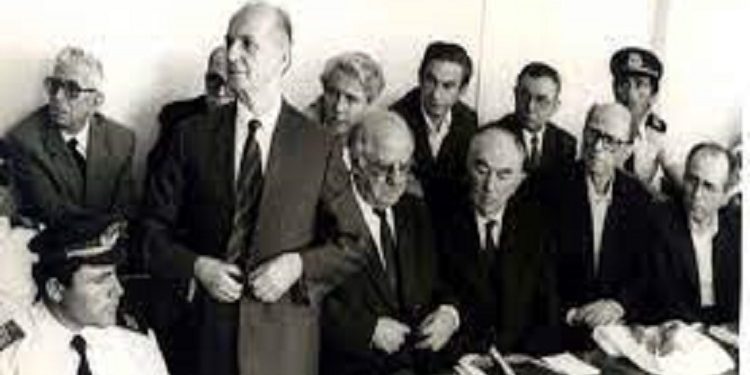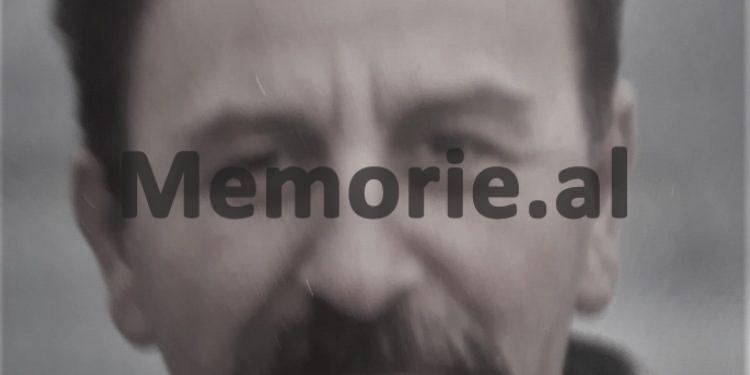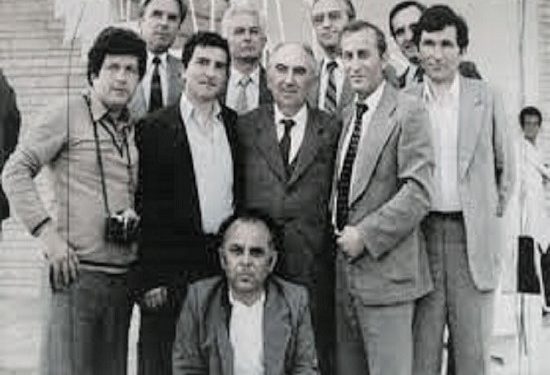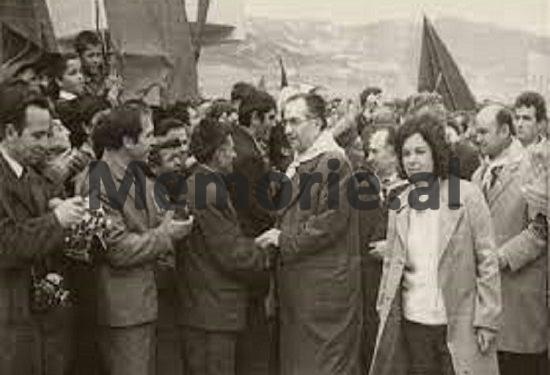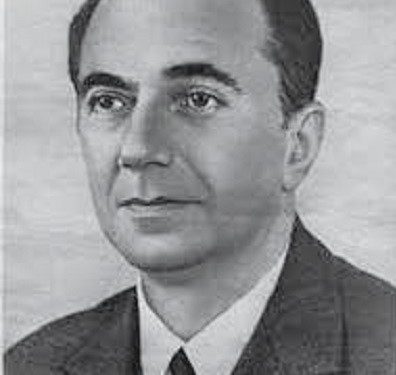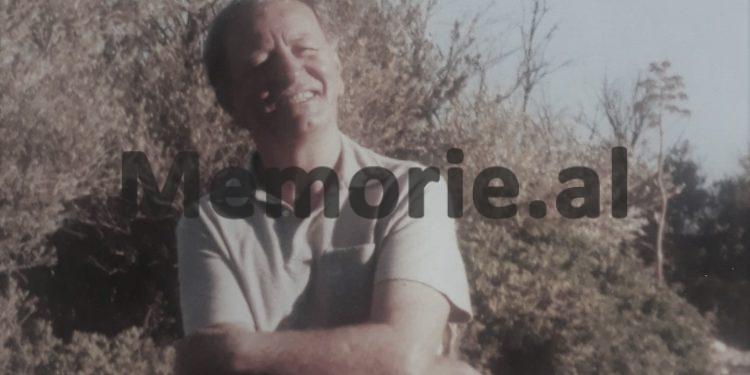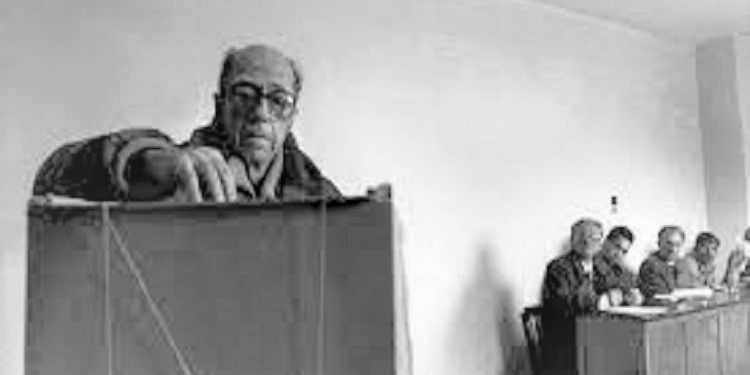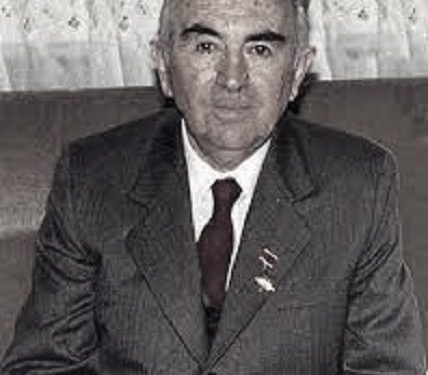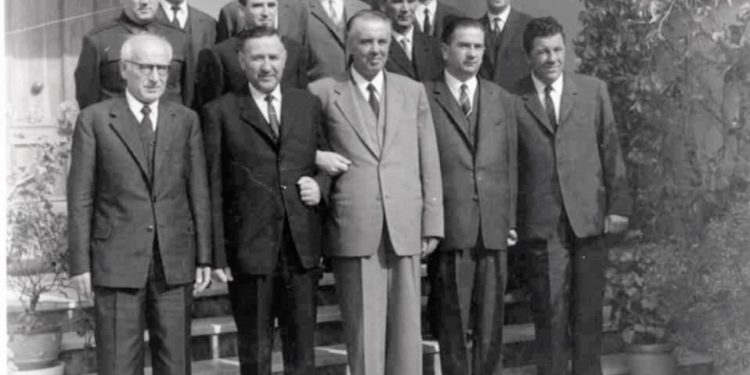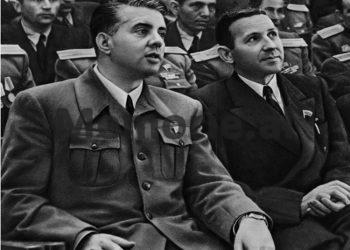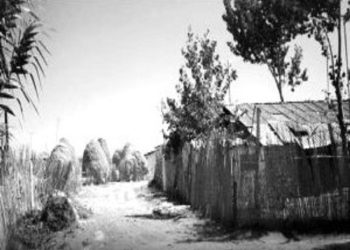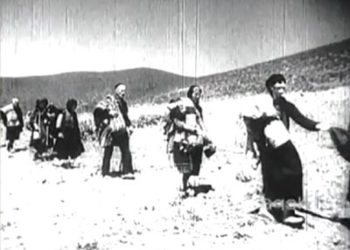By Bashkim Trenova
Part forty-five
Memorie.al publishes the memoirs of the well-known journalist, publicist, translator, researcher, writer, playwright and diplomat, Bashkim Trenova, who after graduating from the Faculty of History and Philology of the State University of Tirana, in 1966 was appointed a journalist at Radio- Tirana in its Foreign Directorate, where he worked until 1975, when he was appointed journalist and head of the foreign editorial office of the newspaper ‘Zeri i Popullit’, a body of the Central Committee of the ALP. In the years 1984-1990, he served as chairman of the Publishing Branch in the General Directorate of State Archives and after the first free elections in Albania, in March 1991, he was appointed to the newspaper ‘Rilindja Demokratike’, initially as deputy / editor-in-chief and then its editor-in-chief, until 1994, when he was appointed to the Ministry of Foreign Affairs with the position of Press Director and spokesperson of that ministry. In 1997, Trenova was appointed Ambassador of Albania to the Kingdom of Belgium and to the Grand Duchy of Luxembourg. Unknown memories of Mr. Trenova, starting from the War period, his childhood, college years, professional career as a journalist and researcher at Radio Tirana, the newspaper ‘Zeri i Popullit’ and the Central State Archive, where he served until the fall of the communist regime of Enver Hoxha, a period of time when he in different circumstances met many of his colleagues, suckers of some of the ‘reactionary families’, etc., whom he described with a rare skill in a book of memoirs published in 2012, entitled ‘Enemies of the people’ and now brings them to the readers of Memorie.al
Continued from the previous issue
WITH “HEROES OF THE PEOPLE”
POLITICAL BUREAU AND THE PRESIDENCY
At the headquarters of the Prime Minister, to prepare the speech that Adil Çarçani would deliver in Myzeqe!
In fact, I met Adil Çarçani once even after Reshit and Jolldyzi and their children left our neighborhood. Adil Çarçani was prime minister at the time. He had replaced Mehmet Shehu in this post. It was then rumored that he had not wanted to be prime minister and had cited his poor health as an argument. I do not remember well, but it must have been 1983, when the editor-in-chief of “Voice of the People”, Arshin Xhezo, told me to go to the Prime Minister. There I would meet and collaborate with a working group, which had prepared a speech that Adil Çarçani would deliver the next day in Myzeqe. This area of Southern Albania had suffered, a few days ago, great damage from the earthquake or from the strong floods, I do not remember well. I do not know why Arshin Xhezo assigned me this task. I was only dealing with international issues in the newspaper. So I had no connection as a journalist with earthquakes or floods and the coverage of their devastating consequences, as well as with other problems, which did not belong to the Foreign Sector of the newspaper, which I ran. Arshini was known for imbalance. He was impulsive. Thus, perhaps, it also explains why he charged me with a completely foreign task for my profile as a journalist.
At the Prime Minister, we finished formulating and reformulating the speech of Adil Çarçani, together with Osman Allken, former journalist of “Voice of the People”, and some others working until late at night. Once it was all over, the problem arose that the speech had to be typed again. There was no typist in the Prime Minister at that hour near midnight. We decided that the typing would be done in the editorial office of “Voice of the People”. This is how this work was done.
The next morning I got up quickly to deliver the typed speech on time. I thought of traveling by the “Ring” bus, which stopped me near the Prime Minister’s Office. In fact the bus was delayed, did not respect the schedule. This caused me to be late. Upon arrival, I saw that a service officer was waiting for me at the entrance of the Prime Ministry. He snatched the typed sheets from my hand and flew along with them. I did not know how to do it, climb the stairs behind him or leave calling my “mission” over. I followed him and found myself in the office of the prime minister’s secretary. I waited very little there. The service officer came out and invited me into the prime minister’s office. Adil Çarçani was standing surrounded by several others. After shaking my hand, he told someone to read his talk. As soon as he finished reading, the Prime Minister shook my hand again, thanked me, and hurried away with the others. I was left alone in his office! No one remembered me anymore. The Prime Minister was late. I was late. He was supposed to be at a certain hour in Myzeqe, where he would speak at a rally in front of the people of the affected areas.
I was upset when, for a moment, I felt like I was alone in the prime minister’s office. I hurried to leave as soon as possible following the others who were no longer visible. On Stalin Boulevard, right after leaving the Prime Minister’s building, I met my old friend Fatmir Kumbaron. After we said goodbye, I told him what had happened to me. “Look, I said to Fatmir with a laugh, once again when I was given the opportunity to meet with a prime minister, I went to the meeting late!”
Even then, but even then, from time to time I thought that, however, I was lucky that this “story” happened with Adil Çarçani, who had replaced Mehmet Shehu as prime minister. Storms, fortunes, swearing, curses, measures, punishments would have fallen on me if the same thing had happened, being Prime Minister Mehmet Shehu.
Adil Çarçani was not known for arrogance and arrogance. He has been calm and communicative with everyone. He has never manifested ambitions for power. Even if we read today the minutes of the meetings of the Politburo, we will see that his interventions are quite rare. In contrast to him, we see others in the race to be as loyal as possible to the dictator and as strict as possible to the next victim, who was chosen by Enver Hoxha as the “enemy” of the Party. Even Sali Berisha himself, chairman of the Democratic Party and prime minister of the country, arguing with his political opponents in the leadership of the Socialist Party, has stated that Adil Çarçani “had more dignity, … more independence”, in the years of dictatorship, than these currently, in the years of democracy!
I do not believe that any employee of the Prime Minister can be found during the period led by Adil Çarçani, who has complained about his brutal, inhuman behavior. I do not believe that any of my compatriots has complained somewhere about any injustice caused directly by Adil Çarçani. Despite all this, as a communist in the leadership of the Labor Party, he has adopted the entire political line, everything that led to the destruction of the country, of human dignity, prisons, internments, murders. He has the responsibilities that belong to him in the functioning of the monster mechanism of the dictatorship of the proletariat. He, in my opinion, has not served as her engine but, nevertheless, has served as a gear of hers, even against his human nature.
Adil Çarçani did not approve the list of names of oil specialists who would be arrested!
I recently read an interview of Vangjush Kokonoz given to the newspaper “Metropol” on October 5, 2008. Vangjushi was an engineer in the oil sector. He, among other things, tells in this interview about a list prepared by the State Security. It listed the names of about 50-60 engineers who would be arrested as saboteurs in an oil asset, held in 1975. Vangjush Kokonozi showed this list, 3-4 days before this asset, to Adil Çarçani. As he recalls, Adil Çarçani reacted by saying: “Ore, did you all scale?! Why, ore, we will put all the oil in prison”?! The escalator was elsewhere, at the top of the communist dome. Against him, Adil Çarçani, like everyone else, was completely powerless, a convinced vassal in the post of prime minister.
After the death of Enver Hoxha, the Albanian Prime Minister Adil Çarçani, took steps to recover the Albanian economy ruined by the total isolation of the country. His meeting on May 14, 1986 with Franz Josef Strauss, Prime Minister of Bavaria, had this purpose. He aimed at opening Albania to the West. In the framework of Enver Hoxha’s Constitution, which was still in force, this was completely impossible. Franz Josef Strauss directly, without diplomacy, will say in this meeting to Adil Çarçani: “From the German side there is a sincere desire to enter into cooperative and honest relations with each other, but I want to say openly what it is, in your opinion, the obstacle that needs to be worked on to overcome”. On behalf of the German side, the Bavarian Prime Minister also presents a series of proposals and offers. Adil Çarçani does not accept the opportunities offered to him because they were contrary to the Albanian Constitution. This Constitution prohibited the receipt of foreign aid or loans. This is how this meeting ends, in fact, with the words of Joseph Strauss: “How will you regulate this, within your state, with your Constitution, we cannot help you.” Albania thus lost years, further deepening the poverty and misery inherited by Enver Hoxha and his policy of complete isolation from the world, a policy that was sold as independence. Years later, in an interview given to the Albanian press, Adil Çarçani’s daughter, Teuta Çarçani, talks about the hostages left to her father in life. Among other things, he expressed regret over the fact why many achievements that Albania achieved in the years of democracy, had not been achieved before!
How I met Nefo Mufti, the wife of Politburo member Manush Mufti
Speaking of the communist dome, my acquaintances with its members, I cannot pass without saying a few words about Nefo Mufti. In fact she was and was not a member of it did and did not belong to it. Nefo was the wife of Manush Mufti, Deputy Prime Minister and member of the Politburo. Her father was imprisoned by the dictatorship as a “bourgeois” in 1945, right after the communists came to power in Albania. In 1947, one of her uncles was shot by the dictatorship as an enemy or collaborator of imperialism. Nefo in her youth enlisted in the formations of the anti-fascist armed resistance. Thus she met her future husband, Manush Mufti.
Nefo Myftiu, being the wife of Manush Myftiu, lived in “Bllok”, as it was called at that time the isolated and bunkerized space where lived, almost all the senior leaders of the Party and the state during the dictatorship. The block was the neighborhood of the red pashas, detached from the rest of the city and the whole country. The bloc was a wild island where everyone was suspected of being potential enemies of the dictatorship of the proletariat and removed as friends, bound by the proletarian ideal. The former Chief of Security of the top communist leadership, Gani Kodra, in an interview given to the Albanian newspaper “Panorama”, described life in Bllok as follows: “You can understand that they (the bureaucrats) were all satisfied, while I I am telling you that I have absolutely ascertained that the opposite was happening. The truth is that they were full of stress and lived in fear. It cannot be said then when he called Enver Hoxha or Mehmet Shehu in the report. In such cases, they waited with frozen blood for the meeting “.
The inhabitants of the ‘Bloc’ swore in the name of the people, they liked to be called “sons of the people”, to be shown at every moment as if they existed only for the people and to sacrifice for them. In fact, even if they could have ever been “sons of the people”, over the years they had completely left him, had become strangers to him, did not know his problems and needs. Gradually the people and they, together with their sejmens, found themselves openly on the two opposite sides of the barricade, with completely opposite, incompatible interests. From what I have had the opportunity to know from this environment, Nefo Myftiu, the daughter of the bourgeoisie, was different and did not fail to show herself differently from others, ostensibly molded with proletarian ideology, but who represented a very bad imitation of the bourgeoisie and who stood , in fact, closer to feudalism, its more negative sides.
I met Nefo Mufti on Radio Tirana. One or two years after I started working in the Foreign Directorate of Radio Tirana, she was appointed director of Radio Tirana for its internal broadcasts. Being in different directorates, we did not have direct working relationships. This did not stop us from talking several times together about work problems. She listened to everyone and tried to find a solution, to be close to the people she worked with and their constant concerns, of the most varied. Her blue eyes and her sincere smile evoked kindness and confidence.
I have not felt in one case the care of Nefo Mufti. I remember, for example, how she called me one day in her office to ask me about my relationship with my mother! I was surprised by this question, but not for long. I told her that my mother was to me not only like that, but also a good friend with whom I shared many of my thoughts and problems. Nefo told me that Kaliroi Hajro, the chief of staff of the Albanian Radio Television, in a meeting of the Party organization, had said that: “The union does not talk to his mother”! According to her, this was what my mother had told her. Kaliro’s statements were common slanders of the servile of the directorate. She was probably also complex because her son, in his youth, was quite problematic.
Kaliroi had been friends in the anti-fascist armed formations with my mother. One day they had met by chance on the street. She asked her mother if I talked to her about the many problems I had with the directors of the Albanian Radio and Television. The mother, who did not want to prolong the conversation, told her that she is not in their current. That was enough for Kaliro to find a weak point where I could be hit.
Nefo asked me if my mother could go and meet him at her office. They met and everything was clarified. I do not know how the events unfolded afterwards. However, I am never mentioned, by anyone, by Kaliro’s fictional story. This, in turn, did not stop pouring smiles and interest from time to time asking me about my mother’s health. I remember this event because I was young then, I had just started work and I believed in the correct and open relations between colleagues, I believed in the idealized society of anti-fascist fighters, who had risked their lives to protect that of their friend. Maybe it was like that, but times change, people change too. What is sacred in war, with its end, for various reasons, often comes down from the pedestal, falls to the ground; value turns into anti-value and vice versa. This is dialectical. We at the Faculty had learned about historical dialectics, but not about the human dialectic in history. In fact, such a subject does not even exist. I would learn that too, like everyone else, in life.
The benevolent proposal of Nefo Mufti, for me to work in the internal Radio that she directed!
Nefo Myftiu, seeing that my relations with the main directors of the Foreign Radio were strained, in various meetings of the General Directorate of Radio Television, has proposed that I move as a journalist to its Directorate, to the Information Office. My old friend, Enver Muça, wrote to me about this on January 28, 1970, in a letter. At the time, I was in the Uznova military unit in Berat, on a three-month training course for reserve officers. “One day,” wrote Enver, “my friend who works at office No. 30 (below) spoke to me and Shabani about the request she made, several times, that you be transferred to K. Stillo’s editorial office. “I do not know how it will be done.” Enver, thinking that the letter could be opened and read by others, before it fell into my hand, uses a not very clear language, does not mention Nefo Mufti by name, about which he once says “friend” and then “she”.
I continued to work in Foreign Radio until 1972, when I left to serve as the Party candidate’s three-year internship in the Construction Vehicle Office. I do not know why the directors of the Foreign Radio or even the general director of the Albanian Radio Television, Thanas Nano, did not think that I should move to the Internal Radio in the editorial office of Koço Stillo! They would get rid of a “disturbing” element on Foreign Radio. On the other hand, I would be calm, devoting myself to work and leaving behind old stories with them. With Koço Stillon I was sure that we would understand each other and cooperate as colleagues, respecting each other. Koço was neither quarrelsome, nor behind the scenes, nor intriguing or careerist. He was very sociable, did not behave like a great boss, was not servile, and did not seek to be servile.
Nefo Myftiu even then tried to remove me from the Foreign Radio. As it was not possible for me to move inside the structures of the Albanian Radio and Television, it tried another solution. Her husband, Manush Myftiu, the deputy prime minister, who also covered Education and Culture, at one point, needed an adviser. Nefo proposes to him my candidacy for this post. Even this time she could not help me.
How and why was my candidacy for advisor to Deputy Prime Minister Manush Myftiu rejected?!
Of course to become the Deputy Prime Minister’s Advisor for Education and Culture, I had to go through a fine selection site. I do not know exactly who was in charge of “studying” the candidacies in a case like this. Can State Insurance! The fact is that my candidacy was rejected. The motive for the rejection, which was never officially stated, was: “The union has friendship with foreigners.” So, one who has such connections with foreigners, could not be trusted to enter the offices and corridors of the Prime Minister. But with which foreigners did I have friendships? With Party friends, with Nils and Renée Anderson. It was the Party that had invited them as friends in Albania. Despite this fact, despite the fact that I would work with them for six years, “normally” I had to keep my distance from them. I had friendships with the Spanish Marxists-Leninists, Maria and Antonio, with the German Marxists-Leninists, George and Monica, Julia and Peter, with the Belgians Jeanne and Jules Vanderlinden, with the French Daniel, Bridget, Pierre and Michel. With all these and others, even after they left Albania I kept for a period a regular correspondence, which I lovingly keep in my small archive.
I did not continue the correspondence with them for some reason. The friends of the Party could not even be my friends, who I was without question at the time, the man of the Party. At least that’s how I believed myself. The friends of the Party were not like that for the Party either. She only declared them as such. In fact, they were viewed as enemies, as agents of foreign intelligence, just like any other foreigner who trespassed on Albanian soil. Such was, for example, Paul Kabongo, later known as Lorent Kabila. I did not know him; I did not have the opportunity to meet him. I knew his “companion”, A. B.
Kabongo or Kabila came to study Marxism-Leninism at the “Vladimir Ilic Lenin” school in Tirana. He came as a friend of the Labor Party. After the overthrow of the dictatorship, some information was revealed signed by “Stilografi”, otherwise A. B., who for several months, had lived in the same room with Kabila in the student dormitory. His mission as an “escort” was to inform the Albanian Security on the movements, thoughts, proposals, wishes of Lorent Kabila, who would later become president of the Congo. B. himself, a former diplomat of dictatorship and later a tentative diplomat of democracy, has acknowledged the fact. He only added that he had done this to serve the high interests of the Homeland! “For Paul, I did not care what to say more even if I had my brother. But of course, even from my country, I did not have to keep secrets about everything that had to do with him “, B. declared publicly. I do not know if B. kept in touch with Kabila, after he left Albania. I do not believe that Kabila was ever remembered for him or for those who invited him as a friend to Albania. Maybe I’m wrong too.
Efforts to reconnect with my former Marxist-Leninist friends?
I have tried to reconnect with my former Spanish Marxist-Leninist friends, Antonio and Marian, after the overthrow of communism. Nils Anderson had told me that Daniel and Bridget knew their coordinates. I gave up with regret when I was told that Antonio and Maria wanted to know in advance what my political position was, if I continued to be a Marxist-Leninist revolutionary!
I met Peter once at the German Embassy in Tirana in the early years of democracy and another time in Brussels, at the house where I lived, when I was still Albania’s ambassador to the Kingdom of Belgium. I was told that he bought a house in the mountain village of Dardhë in Korça, in the south of Albania, and lives there. Only with Nils and Renée Anderson, I was able to restore the old and lasting friendly ties after several years of severance. But let us return again to Nefo Myftiu, to say a few words about this woman with Great Spirit and with a sad fate just as great.
Nefo Myftiu encouraged and helped those creators who promised to give a house to Rruzhdi Pulaha and Kiço Blushi!
Nefo tried to encourage and help all those who worked, who promised a lot with their work, all those whom the communist bureaucracy on the Radio had suppressed, who had suppressed their talents. She, with a devotion that she seldom met in those days, was always near to people in need. Thus, for example, thanks to Nefo’s interventions in the local government, Kiço Blushi and Ruzhdi Pulaha were given apartments, which in the following years would become well-known and successful writers, screenwriters and playwrights. An apartment was also given to Enver Muca, who at that time promised a lot, but fate did not promise. Nefo helped Reshat Arbana leave Radio Tirana, where he was busy preparing children’s shows, to climb to the heights of the People’s Theater stage and become as popular as here on the big screen, in Albanian cinematography. Thanks to her help, the unforgettable speaker of Radio Tirana, Vera Zheji, became a lecturer of artistic speech in the theater branch, at the High Institute of Arts, where she worked until 1988, when she retired. I could go on to mention other cases, but it is not in my care to make lists. Memorie.al
The next issue follows




